
Shop Amazon - Create an Amazon Baby Registry
Prudentius’ Psychomachia
'Conflict Of The Soul'
Leyden, Universitatsbibliothek, Cod. Burmanni Q 3, 9th century
Chastity (Modesty) and Lust
folio 123v: Chastity fights against Lust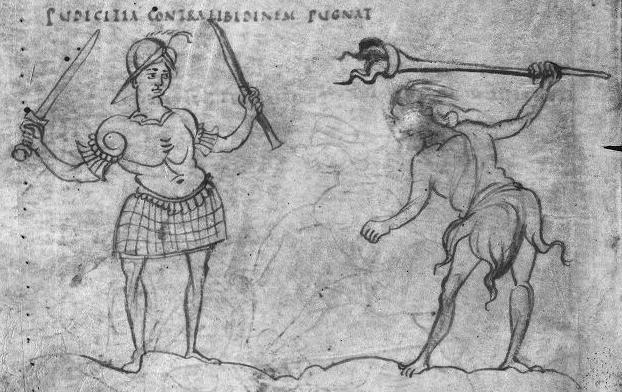 PUDICITIA CONTRA LIBIDINEM PUGNAT folio 123v: Chastity hits Lust with a stone 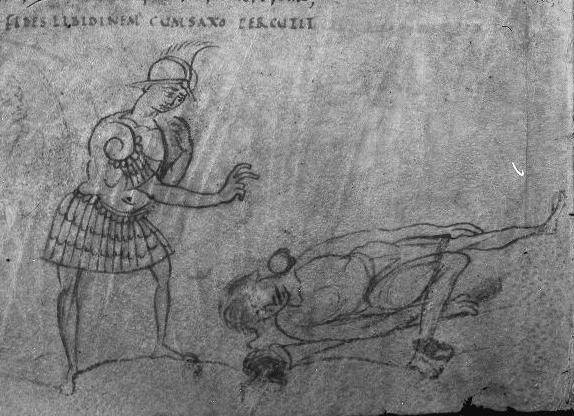 FIDES (sic) LIBIDINEM CUM SAXO PERCUTIT folio 124r: Chastity stabs through Lust with a sword 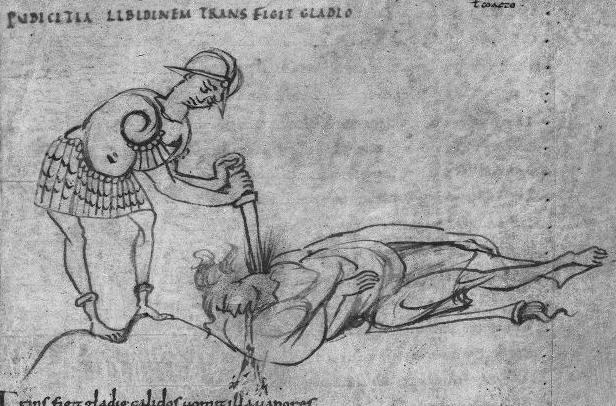 PUDICITIA LIBIDINEM TRANS FIGIT GLADIO folio 124r: Chastity rebukes the extinct Lust 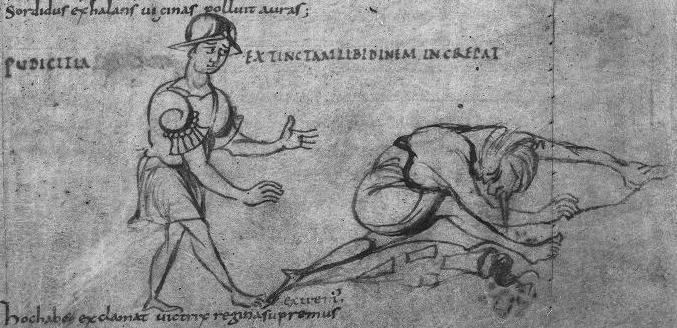 PUDICITIA EXTINCTAM LIBIDINEM INCREPAT folio 125r: Chastity washes her sword in the Jordan river 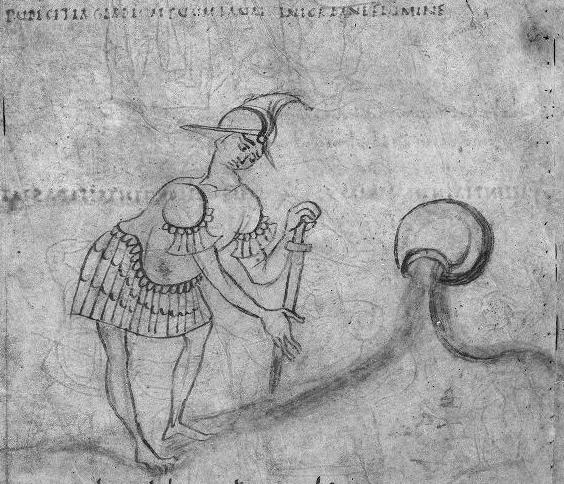 PUDICITIA GLADIUM SUUM LAVIT IN IORDANE FLUMINE folio 125v: Chastity stores her sword under the altar 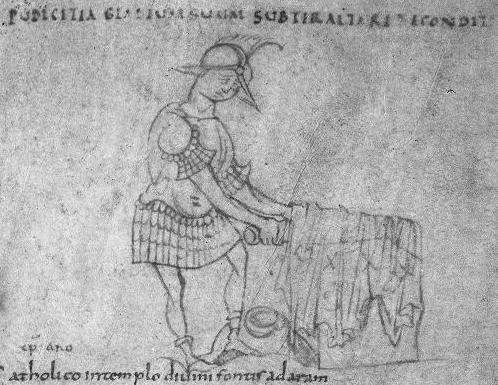 PUDICITIA GLADIUM SUUM SUBTER ALTARI RECONDIT |
A translation by Maureen S. O’Brien Next on the grassy field appeared Modesty; The virgin shines in lovely armor. The Sodomite Lust is advancing, whose ancestors warred with torches – and a burning pineknot dipped in spruce tar and sulphur, she thrusts in the maid’s eyes. Modesty grabs for the flaming light, and Lust tries to choke her with smoke. But Modesty, the fearless virgin, tosses a rock with her right hand at the dire she-wolf’s red-hot weapon. Thrown down, the pine torch goes out. Then the whore’s bared neck’s bored through with a shortsword. She vomits hot steaming clots of infected blood; exhaling her rotted breath, she pollutes the neighboring air. “She’s done,” exclaims the queen victrix, “This will be your end, supreme one. You’ll be flat on your face forever, not daring to spit deadly flames at God’s servants, men or maids. Only Christ’s lamp kindles chaste souls. Harasser of humans, think you can recover doused powers, or grab breath to warm you? “After the Assyrian bedroom? Holofernes’ neck was chopped; the drunk’s desire washed out in his blood. Sharp Judith scorns the jewels and pillows of the wife-betraying warlord and quenches sinful frenzies with a sword. The woman is carrying back from the foe, a notorious trophy. Go with unshaking hand, bold heavensent defender!” Maybe the strong matron’s companions up till now were fighting under the shadow of the Law, Still, our times she shapes. In truth, strength flows into earthly bodies; the head of the great is cut off by the weak, powerless servants. “And after divine command already gave an untouched virgin childbirth, is it possible anything’s left still to be done to you? After the virgin birth — by which the former origin of the human body deserts nature, and the High Power brings forth new flesh, and the unmarried wife even conceives God the Christ – mortal man from his mother, but divine from his Father. Even now, from that which conceives Him, everyone’s flesh is divine, and takes the character of co-heirs of God, by league of alliance. “Of course, the Word made flesh doesn’t lose being what it has been, while the Word glues on experience of the flesh – His majesty not diminishing through it, but drawing the poor ones up to be nobler. What He has always been remains so, while He’s beginning to be what He’s not been. We, who were not, are what we weren’t already; we will be made wealthy, born into better. He carries me back to myself, remaining Himself. Nor does God lessen what’s His by what’s ours; instead what is His becomes our own; and He has carried us up to Heaven with the gifts He granted us. “Gifts like this — that you lie conquered, filthy Lust, nor, after Mary, are able to break through what’s right, what’s our duty. “You deathroad guide, you gate of ruin, staining the body and plunging the soul into Tartarus! Take your gloomy head, still cursed with cold, down to the Abyss! Die, brotheldweller! Beg to the manes! Be shut in Avernus, and dumped to the deeps of the shadows of night. May fiery streams pull you under, may black and brimstone streams whirl you round through resounding whirlpools – and already, Greater one of furies, you may not tempt Christ-worshippers, for their cleansed bodies will be guarded for the King.” She said this, and glad Lust was killed dead, Modesty washed in the Jordan’s waves the corrupted shortsword sticky with ichor’s red dew, and the wound-spotted shining iron. So the victorious victrix purified the point in the teaching river, destroying by baptism what’d been blemished by the foe’s jugular; nor yet was contented to sheathe the cleansed shortsword back in its scabbard, lest rust under cover occupy rough spots she had washed off and eat off its sheen. In a Catholic temple of the divine spring, she consecrated it where it coruscates with light eternal. |